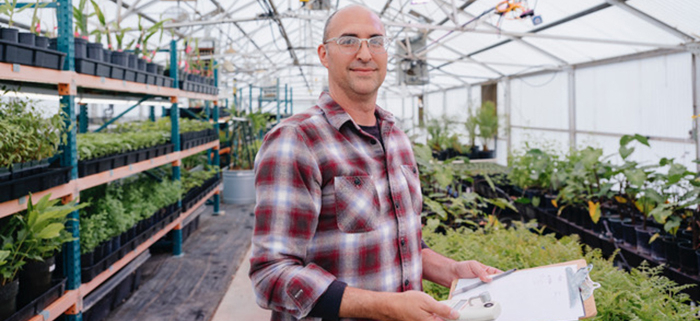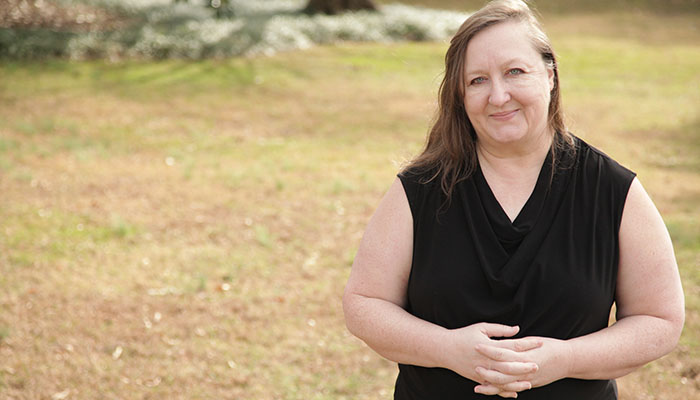UC Davis Researchers Awarded Aggie Climate Action for Equity (ACE) Grants to Lead Innovations for Climate Change Solutions
By Neelanjana Gautam
The State of California, through the University of California Office of the President, has granted $1 million for the Aggie Climate Action for Equity (ACE) initiative to enable the transition of early-stage climate-based projects to the next phase of tangible development.
By amplifying the number and quality of translational and proof-of-concept pilot projects emerging from the University of California, Davis, the ACE grants could play a tangible role in climate change mitigation, resilience and adaptation. The ACE program is managed by Venture Catalyst, under the Office of Research.
For the fiscal year 2024-25, seven projects were selected, and the recipients received up to $90,000 each to advance action-oriented clean-tech innovations to positively impact California’s communities vulnerable to the effects of climate change.
The ultimate objective of the program is to develop innovations that attract entrepreneurs, non-profit organizations, industry, government agencies and/or investors willing to commercialize UC Davis innovations, resulting in societal and economic impacts aligned with the UC Davis Land Grant mission.
“The range of solutions being pursued by the recipients highlight the bold thinking of our faculty and exciting possibilities for our future,” said Simon J. Atkinson, vice chancellor for research at UC Davis. “The investment by the state in advancing these solutions is critical and will continue California’s leadership in responding to climate change with innovative mitigations.”
External review committees consisting of industry professionals, investors and experienced entrepreneurs, assembled by Venture Catalyst, reviewed the proposals and recommended the recipients of the ACE awards.
Join the ACE awardees at the UC Davis Research Expo on April 18 where they will discuss about their vision related to the challenges of climate change as part of a panel discussion: “Aggie Climate Action for Equity: A Showcase of Innovations Addressing California’s Climate Challenges.” The session will be moderated by Belen Flores, ACE program manager, Venture Catalyst. Attendees can hear from all seven awardees during this breakout session from 2 p.m. – 3 p.m. and learn more about their innovations.
Recipients of the 2024-25 ACE grants
Net-zero Greenhouse Crop Production with Climate-smart Solar Screen
MD Shamim Ahamed
College of Engineering
Greenhouse crop production has attracted more people recently as a climate-smart solution for growing year-round. In this project, Assistant Professor Md Shamim Ahamed from the Department of Biological and Agricultural Engineering and the team will investigate the proof-of-concept for designing a novel climate-smart PV screen for greenhouse integration to replace conventional shade screens. The proposed project will analyze the synergies with climate-smart PV screens to reduce energy and water demand and maximize power conversion efficiency without impacting yield. The project aligns with California’s climate action priorities, like building a climate-resilient economy and reducing greenhouse gas emissions with green energy and climate-smart agricultural practices. The specific activities are to model the development and optimization of the proposed smart PV screen, design pilot testbeds, and investigate the power conversion efficiency (PCE) and the crop performance regarding their biotic and abiotic stress and resource usage.
A Novel Homebuilding Technology for Affordable and Wildfire-Resilient Homes
Michele Barbato
College of Engineering
Professor Michele Barbato proposes to develop a technology that uses adobe, or rather its engineered form called compressed and stabilized earth blocks, to build houses that are affordable, sustainable and safe against multiple natural hazards, including hurricanes, tornadoes, earthquakes and wildfires. His innovations include advancements in material properties, construction techniques, numerical simulation models, and design and construction standards for earthen masonry. In California, where people have witnessed the largest and most destructive wildfires in recorded history, Barbato’s energy-efficient and eco-friendly means of construction offers a significant opportunity to address the effects of climate change. Since the materials are non-combustible by nature, they are resistant to any type of fires. Barbato’s research could be transformative for the homebuilding industry in the United States and worldwide for its ability to drastically reduce both carbon footprint and construction costs. It could also pave the way for constructing soil-based buildings in rural wildland-urban interface areas while addressing the housing needs of socially and economically disadvantaged groups.
A Novel Biofilter for Emission Mitigation and Ammonia Recovery from Dairy Manure
Hamed El Mashad
College of Agricultural and Environmental Sciences
Legislation in California requires a 40% methane (CH4) emission reduction from 2013 levels by 2030. Lagoons emit over 80% of the emissions from dairy manure. Manure management technologies are employed to mitigate emissions. However, other technologies are needed to reduce emissions with nutrient recovery from manure.
Researcher Hamed El Mashad’s project aims to design and evaluate a biofilter to reduce CH4 emissions and capture ammonium from manure. The objectives are to design and construct a biofilter using biochar, as an ammonium adsorbent and as a carrier for methanotroph, for emission mitigation; and to evaluate the performance of the biofilter by measuring the emissions of CH4 and ammonia (NH3) as well as the removal of ammonium from manure; and to conduct a cost analysis of the developed filter as a tool to reduce CH4 and NH3 emissions and produce biochar-rich ammonium for fertilizer purposes; and disseminate project results. The project is timely and important to achieve sustainable milk production.
Cultivating Climate Resilience: A Fire Stewardship Decision Support Tool for California Tribes and Beyond
Nina Fontana
College of Letters and Sciences
Researcher Nina Fontana’s project responds to California’s escalating wildfire threat by creating data-informed opportunities for Northern California Tribes to expand the application of fire. Aligned with state climate adaptation priorities, the team will develop a Fire Stewardship Decision Support Tool WITH three Northern California Tribes in collaboration with First Nations Emergency Services Society (FNESS). This proof-of-concept pilot serves dual roles as a nurturing technology and a policy intervention. By utilizing geospatial imagery, mapping, and modeling, these tools will empower communities in making informed decisions on cultural burning priorities and wildfire preparedness. Rooted in community engagement, the outcomes include user-friendly tools, four inter-Tribal learning opportunities (including two in-person workshops), and the creation of multilateral inter-Tribal partnerships. The project’s dissemination potential extends to the creation of multi-stakeholder partnerships and the potential of an Indigenous-led, non-profit establishment, addressing various climate risks and fostering workforce capacity-building. This long-term initiative would treat millions of acres of California land, effectively mitigating climate change impacts and yielding billions in savings for both the State and its residents.
Sustainable Soils from Pistachio Shell Waste
Jackson Gross
College of Agricultural and Environmental Sciences
Aquaculture Specialist Jackson Gross’ project taps into California’s pistachio shell waste, crafting sustainable soils for the $4.25B potting soil and growing media market, countering peat scarcity and the unreliability of coconut coir imports exacerbated by climate change. Their nutshell enriched substrates not only sequester carbon but also promise elevated crop yields, carving a niche in an industry eager for reliable, California sourced, eco-friendly alternatives. Poised to scale, this innovation reduces waste, curbs emissions, and aligns with climate action, offering a strategic advantage in both local and global agricultural markets. The soil exemplifies the synergy of economic and environmental stewardship, while combating climate impacts and leading the charge toward sustainable California agriculture.
Quantifying Carbon Sequestration in Seagrass Meadows: Testing Methodologies for Climate Mitigation, Resilience, and Carbon Markets
Tessa Hill
College of Letter and Sciences
Given California’s leadership on climate action and identification of seagrass meadows as a priority habitat for climate resilience and carbon reduction, Professor Tessa Hill and team propose an evaluation of carbon sequestration achieved through seagrass restoration in Elkhorn Slough, and Tomales Bay, California. Seagrass meadows play an essential role in supporting local fisheries, enhancing water quality, and safeguarding coastlines against erosion. Globally, research has shown that seagrass meadows also trap and store carbon, thereby serving as a nature-based solution to climate change. Their work will take place in close partnership with conservation organizations, who will utilize the team’s results to inform future restoration efforts as well as community engagement. The ultimate objective is to test and compare different methodologies through this proof-of-concept work that non-profit organizations, industry, government agencies, and/or investors will be able to use effectively in marine carbon sequestration assessments.
Producing Bioplastic Products from Dairy Byproducts
Ruihong Zhang
College of Engineering
Professor Ruihong Zhang and team are developing environmentally friendly technology that may reduce the harmful effects of plastic use in the world. Zhang’s project will help transform California dairy and other agri-food industry into a climate-smart business and decarbonize plastic products by using dairy byproducts into high value bioplastics that can have wide food and non-food packaging and service applications. The new technologies will enable the development of distributed biorefinery and biomanufacturing facilities near dairy farms and processing plants, creating high value jobs in rural communities. The goal is to optimize and scale-up bioprocesses for producing Polyhydroxyalkanoates (PHA) from cheese whey and whey permeate and to create and evaluate PHA-based bioplastic food packaging products and determine the properties and functionalities of bioplastic products.







